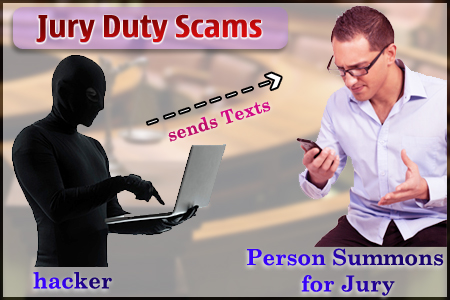Jury Duty Scams
scams and become a victim to the scammers those who are operating from distant lands. These days' scammers pose themselves as magistrates, attorney and lawyers and swindle the money from the innocent victim.
Jury duty scams involve fraudulent attempts to exploit individuals’ fear of legal consequences by impersonating court officials or law enforcement agencies. Typically, the scammer contacts the target, claiming they have missed jury duty and now face fines or an arrest warrant. To resolve the supposed issue, the victim is coerced into providing personal information or making immediate payments.
It is important to note that legitimate court communications are never conducted over the phone, and officials would never demand immediate payments or sensitive information. To avoid falling victim to jury duty scams, individuals should verify any such communication directly with their local courthouse, refrain from sharing personal information over the phone, and report any suspicious contact to law enforcement. Awareness and skepticism are key defenses against these deceptive tactics.
More such shocking news will make the rounds in the future, especially when authorities continue to observe these activities as mute spectators. Jury duty-related scams are increasingly making headlines. These scams are often tied to identity theft, where scammers attempt to steal personal details such as Social Security numbers, date of birth, credit card numbers, and expiry dates by sending emails or making phone calls.
These emails may appear genuine and contain alarming phrases like, "You have failed to report for jury duty and the court has issued an arrest warrant against you." Such scams are particularly widespread in the states of Michigan, Ohio, Texas, Arizona, Illinois, Pennsylvania, Minnesota, Oregon, and Washington, with police authorities in these states receiving numerous complaints.
Scammers may also pose as jurors or court officials, calling from distant locations. Their voices are often bold and confident, striking fear in the minds of unsuspecting individuals. Once the victim falls into their trap, scammers can steal all personal data in a flash and vanish with the victim's money.
Citizens should follow the guidelines below when receiving such suspicious calls:
-
Do not fall prey to bold and confident voices. If a scammer claims to be calling from federal court and holds a high rank, don’t engage — simply hang up immediately.
-
Never share your Social Security number, bank details, or other financial information with third parties or strangers.
-
Escalate the matter to the Clerk of Court, local police authorities, or the FBI, who can investigate further.
-
Avoid forming emotional bonds or engaging in friendly conversations with the scammer, as they will use rapport to manipulate and steal from you.
-
If you receive scam emails, send a firm response to deter them, or better yet, report and block them.
-
Discuss the incident with friends or colleagues to check if they have received similar calls or emails from scammers.
Scammers may also send fraudulent letters stating that an arrest warrant has been issued for non-compliance with a property law or tax regulation. Do not respond to such jury-related letters. Tear them up and discard them immediately.

